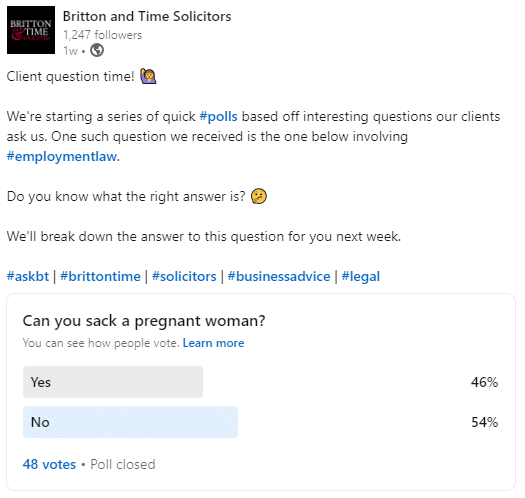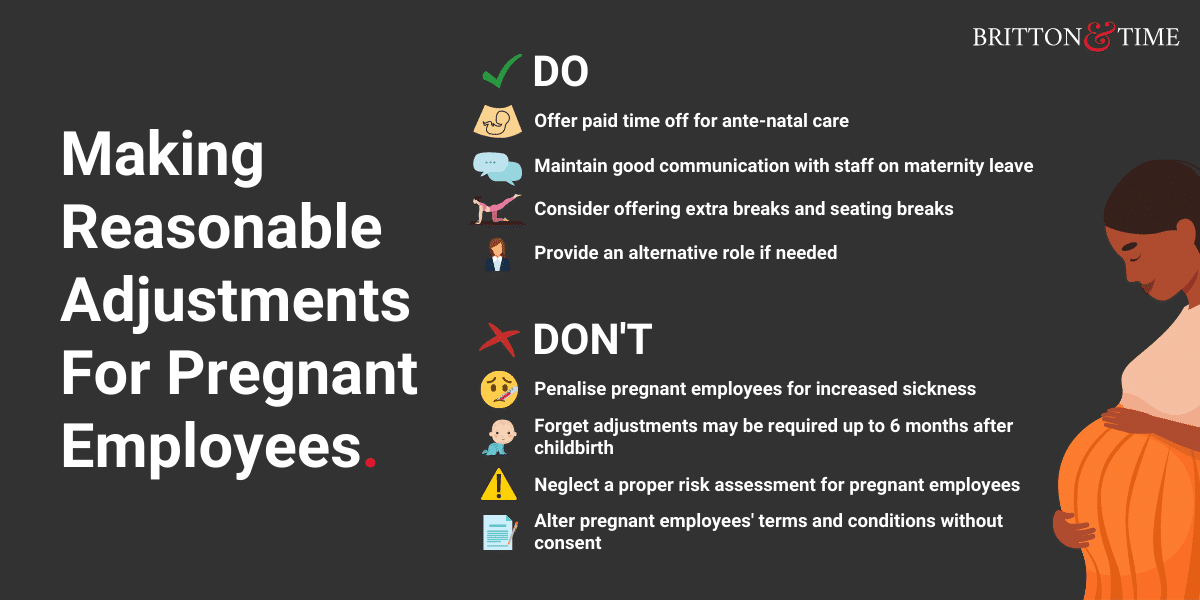At the start of May, we ran a poll on our LinkedIn page asking if you can sack a pregnant woman. The question came from an enquiry in April, where a business owner was struggling with this same conundrum. Opinion was heavily divided, with an almost equal split on answers, so we thought we would have our resident legal mythbuster and expert on employment law, Paul Britton, weigh in on the discussion.
So, what’s the answer?

Is it against the law to fire a pregnant woman?
The answer to this question isn’t as simple as it might sound. When it comes to pregnancy, the law contains several grey areas, which can lead to confusion mainly for employers. Due to this, some employers treat pregnancy with a ‘red flag’ approach, meaning they won’t take any action against pregnant women, even if warranted.
In the simplest terms, you can fire a pregnant woman, but you cannot fire a woman because she is pregnant.
As an employer, even if you don’t believe the dismissal relates to pregnancy, you should still be careful. There is also the more philosophical question outside of the law of whether or not sacking a pregnant woman is morally advisable.
Let me break it down below.
Pregnancy discrimination
By law, pregnancy is a protected characteristic. This means if you’re pregnant, it becomes unlawful to treat you less favourably than colleagues because of that characteristic.
This protection extends beyond the actual pregnancy itself, where discrimination could take place because of the fact that a woman was pregnant, or due to associated activities or requirements. However, this would normally go on to fall under gender discrimination.
But these protections only extend to the fact of pregnancy. In plain terms, if you are pregnant and treated differently because of reasons unrelated to your pregnancy, this may not constitute discrimination.
Why can this cause problems?
Strangely enough, not every pregnancy is the same. As we all know, pregnancy affects each person differently and some women may not know that they are pregnant until 1 to 2 months in.
With pregnancy can come an array of symptoms with differing effects. For example, severe morning sickness could push someone who was already on an improvement plan to the brink of termination.
If the employer goes on to sack that person, this could raise eyebrows. In this particular situation, the questions raised might include:
If the employee were not pregnant, would she have failed her improvement plan and faced dismissal?
Sacking a pregnant woman, or indeed any employee, based off a theoretical outcome is dangerous. In this case, this is a hypothetical situation that could go either way.
If the employee’s performance was particularly bad prior to pregnancy, an employer could take the risk of sacking them and hope for the best. Obviously, this comes with risk.
A more nuanced approach would be to offer reasonable adjustments to allow more flexibility in policies and working practices for the pregnancy. If the employee is still not able to perform to the required standard, any subsequent dismissal would likely be much safer.
Would this be unfair dismissal as the dismissal was ultimately down to pregnancy, a protected characteristic?
It depends on how each side argues their case and how persuasive those arguments are. Remember that protected characteristics don’t mean employees are automatically immune from dismissal.
If the employee was showing improvement, but on discovering she is pregnant her performance drops, arguably this might be related to pregnancy. If the employer makes no reasonable adjustments and the employee is dismissed, it may constitute unfair dismissal.
Did the employee know herself that she was pregnant at the time?
An employer is under no obligation to make reasonable adjustments for a condition they are unaware of. The same is true if an employee refuses to disclose their circumstances.
In short, if the employee doesn’t tell their employer of the pregnancy, there is nothing the employer can do. Moreover, there is no legal expectation on the employer.
Issues arise if the employer suspects or believes the employee is pregnant. In such cases, they need to offer the employee the same protections as if she were pregnant.
What if the employee works in a hazardous environment that could cause harm to the baby?
Risk to an unborn child is a health and safety risk and employers need to treat it as such. If a pregnant woman can no longer perform all her employment duties due to risk to the baby, the company will either need to make adjustments or find her an alternative duty.
If the employer knew that the employee was pregnant, did they make adequate reasonable adjustments?
This depends entirely on the size of a business, the number of people it employs and the revenues it drives.
What constitutes ‘reasonable’ for a small business will differ vastly from that of a large business. For example, a small business operating out of offices spread across multiple floors that employs a wheelchair user may find it reasonable to install a ramp into the building and create a workspace on the ground floor. A large business might need to install a lift, or widen doorways at a greater cost than that of a small business.
Sacking a pregnant woman who had no reasonable adjustments in place isn’t advisable, even if she was performing poorly.
It’s easy to see from these questions why a ‘hands off’ approach is much more palatable for employers. Even for solicitors, particularly those who don’t regularly practice employment law, these issues can make you pause for thought. The number of different types of scenario that could arise are endless. That’s why it’s so important to examine each case individually.
So when can you sack a pregnant woman?
In the example above, where a woman’s pregnancy has led to her termination from an underlying performance issue, it’s possible to argue that this wasn’t due to pregnancy discrimination.
At a basic level, you would look at evidence such as what the employee’s historic performance record was to see whether this was an ongoing issue.
The employer would need to have put in place reasonable adjustments to accommodate the pregnancy, for example allowing more instances of lateness or sickness. This would also include other physical adjustments such as allowing the employee to sit while working. How large these adjustments are would rely on the size of the business.

Even if these changes might constitute adequate adjustments, you still have to hope that the employment tribunal agrees with you as the employer. As with any matter that goes before a judge, having a strong case only improves your chances of success. It does not guarantee it though.
Let’s not forget too that the employment tribunal is generally ‘cost neutral’. This means that you cannot ‘win’ any compensation from the employee in the employment tribunal. There are exceptions to this, but realistically as an employer you shouldn’t expect anything back. It also means that win or lose, you will still need to pay your solicitor’s legal fees. In fact, the only cost you might save is the theoretical potential wage cost of that employee.
What would your advice be?
The reality for many businesses is that it all comes down to a cost vs time vs effort argument.
- How much would it cost to take advice on the matter vs how much would you pay that employee until their return to work?
- How long would you need to invest in finding this information before you are comfortable with taking action?
- And isn’t it just easier to not do anything when there are so many other things you could be focusing on within the business?
Ultimately, you can sack a pregnant woman from a legal perspective but the process is fraught with potential pitfalls.
Businesses are unlikely to recoup the sunk cost of seeking relevant advice and representation if things go wrong.
However, you would need to balance this against any reputational or revenue damage a poor performing employee might bring. Each situation needs to be carefully considered by employers.
Remember that in the end, doing nothing is still doing something and it can be the best decision.











Leave a comment Your email address will not be published.